Eating animals, is that still ok?
-
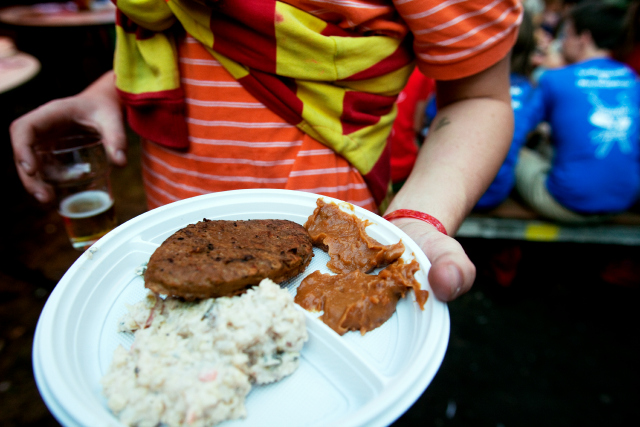 Foto: Duncan de Fey
Foto: Duncan de Fey
Should we still eat animals in the year 2019? The Nijmegen Campus is deeply divided on this issue. Death is part of life and there’s no such thing as CO2-neutral food, says professor Marcel Wissenburg. Colleague Roos Vonk compares the bio industry to a concentration camp.
Here’s a fact. Our planet is in poor shape, concludes a UN report published in March. And this is due in part to meat production, which requires huge amounts of water and leads to high greenhouse gas emissions. Yet that isn’t why Psychology Professor Roos Vonk decided to stop eating meat three decades ago. Animals are not here for our use and convenience, says Vonk. Who are we to lock them up in small cages or, in her own words, ‘concentration camps’? ‘I know the word evokes resistance, but I still use it. Just take a look at some YouTube videos of barns full of breeding sows. It’s exactly like a concentration camp, where animals are reduced to objects.’
Environment
During her studies, in the 1980s, being a vegetarian was something different. She had to justify herself continuously. Things have changed in this respect. These days, when she tells people she’s a vegetarian, her table companions fall over each other to apologise: ‘We don’t eat that much meat either, you know!’
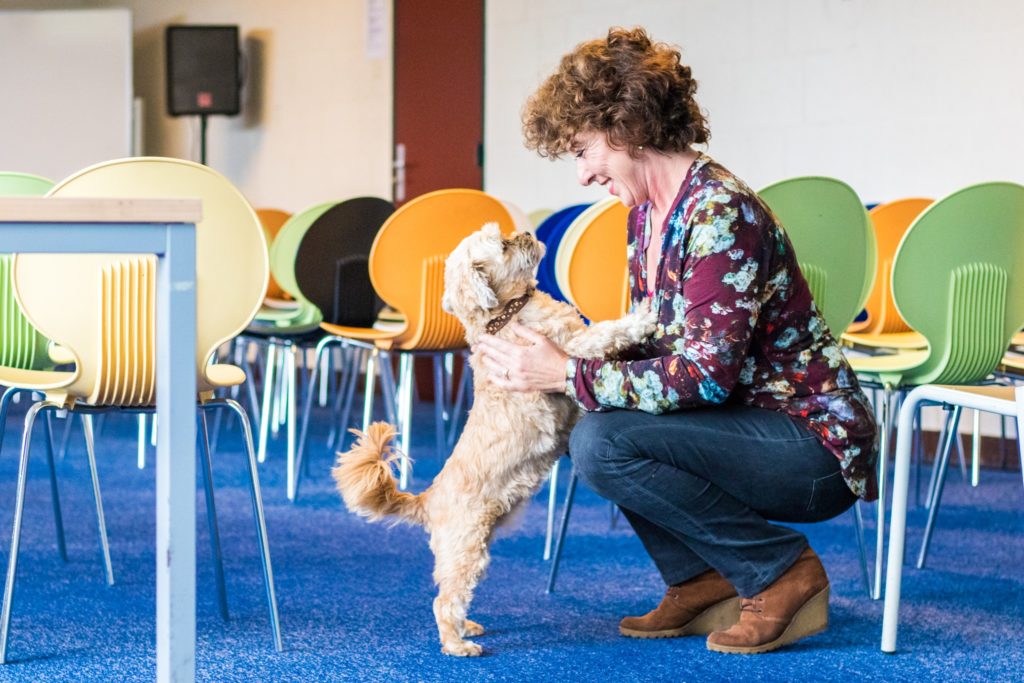
The fact that the current concerns about climate change raises people’s awareness of their meat consumption is a very good thing, says Vonk. She sees clear signs that things are changing. ‘I see that the understanding that animals have feelings and are capable of suffering is slowly making its way into mainstream society.’
Professor of Political Theory Marcel Wissenburg is not so sure. It depends what social circles you move in. Among left-wing intellectuals, being a vegetarian may be a hot topic, he says in his room in the Elinor Ostrom building, ‘but if I look around in Nijmegen, at my neighbours and other people, I see something quite different. These people are clearly not bothered by such whims.’
Of course his neighbours think about issues like animal suffering and cruelty. And some say they would prefer to eat less factory-produced meat. ‘But if you have to pay double for the same piece of meat and you’re on a tight budget already, the choice is easily made.’
‘We have no obligation to treat animals better than they’re treated by the rest of nature’
Two extremes on the Nijmegen Campus, and both represent a large section of the population. Are humans allowed to kill animals? Yes, says Wissenburg. ‘Killing is not intrinsically bad; death is part of a natural life, and we have no obligation to treat animals better than they’re treated by the rest of nature.’
Killer
But to slaughter them without stunning, that goes too far, he says, ‘because we know that there are better ways to die’. Unlike animals, people can weigh good and evil, and choose to act accordingly. ‘I don’t often see snails pondering issues like this.’
What does he eat? A lot of game, mainly wild fowl. This has more to do with his low cholesterol diet than with a politically correct choice. His diet doesn’t allow him to eat red meat, pork or lamb. ‘Lamb in particular is apparently very bad for me, which is a pity because I really like it. But what can you do? I’d like to live to see my retirement.’
For the rest, he tries anything that appeals to him. ‘A few days a week, I eat fish and, I’m not afraid to admit it, just because I wanted to see what they tasted like, some things from the Vegetarian Butcher. I’ve replaced the sausages in my monthly English breakfast with this brand’s sausages. They’re really incredibly tasty.’
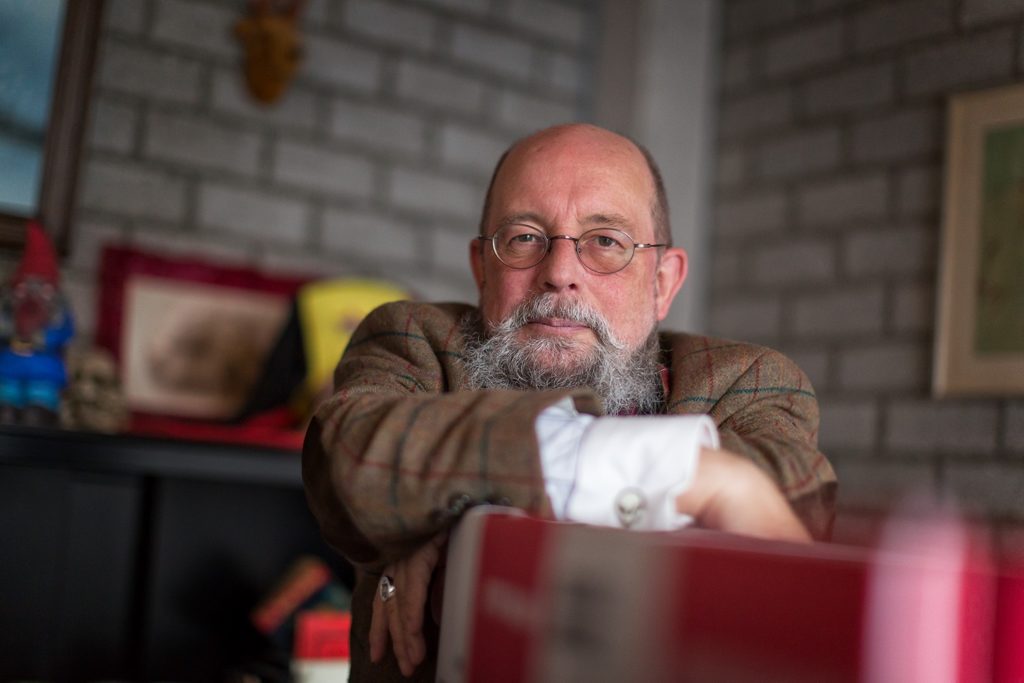
Wissenburg caused a stir when he campaigned against the Meat Free Monday introduced by Campus Restaurant De Refter three years ago (and cancelled since). He says he wants to be free to decide what he eats himself. What’s more: ‘The University is a place where people think, where they can reach rational decisions. It’s not a place where you impose things on others.’
As far as Vonk is concerned, Meat Free Monday is the least we can do. ‘We eat a lot more meat than is natural or healthy for us. In the past, people wouldn’t have been able to eat meat every day. They would occasionally catch a wild boar, and then make it last for months on end. In the 1950s, people ate meat twice a week at most; it was a real luxury item. Now we kill 1.8 million animals a day in the Netherlands alone. Our mass production has gotten completely out of hand.’ Even better than a meat-free Monday would be a broad daily assortment of vegetarian and vegan dishes.
‘Now we kill 1.8 million animals a day in the Netherlands alone’
Vonk is uncompromising on the subject of animal killing. Even with stunning, pigs and chickens go through hell at the slaughterhouse, she says. ‘Everything is focused on maximising speed and quantity, so the people working in slaughter houses have no time to calm the animals down. Many animals aren’t even stunned properly. And of course they resist; they don’t want to die.’ If you claim to only eat ‘animal-friendly’ meat, you’re in complete denial. ‘You’re just trying to make yourself feel better.’
Vonk’s intuition that the Dutch diet is changing is correct, says Sociologist of Consumption Hans Dagevos from Wageningen University & Research. ‘We see all kinds of changes,’ he says, such as a rise of plant-based meat substitutes. ‘Over the last few years, these products have greatly improved, and the sector is constantly putting out new products. The Dutch are very good at creating plant-based alternatives.’
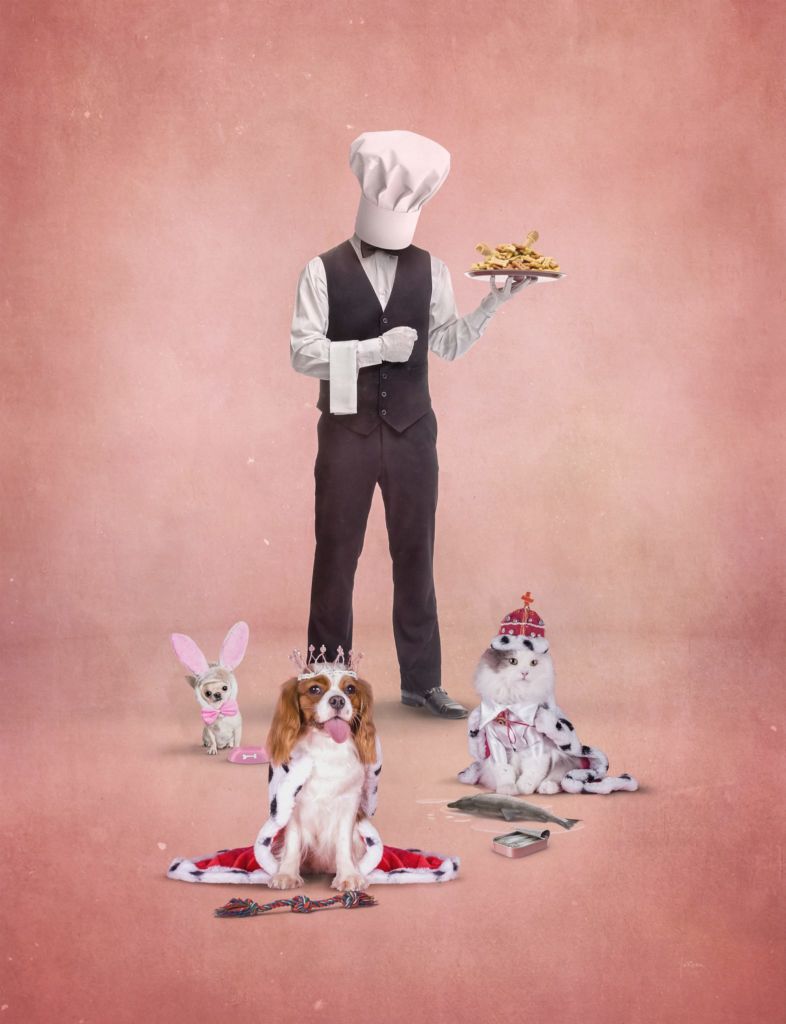
And yet, this hasn’t led to a reduction in meat consumption. The average Dutch person still eats 38 kilograms of meat per year, just as he or she did ten years ago. So Marcel Wissenburg is also correct in his observation that people aren’t prepared to give up their steak.
Currently, meat substitutes represent no more than 1 or 2 % of the total market. In online surveys, people often say they intend to eat less meat, but they don’t follow up on it, says Dagevos. Then you have the big meat eaters, usually men, who sometimes consume up to 300 grams of meat a day. A rump steak at dinner time, a croquette as a snack, salami on your sandwich, and a sausage in front of the TV. And that while the Nutrition Centre recommends 70 grams a day.
Roos Vonk and her ilk are a minority in the Netherlands. Dagevos estimates that a little less than 5% of the population is vegetarian, approximately 800,000 people. It’s unclear whether highly educated people eat less meat than the rest of the Dutch population. There are no reliable data, which according to the sociologist points to the Dutch government’s lack of interest in steering meat consumption.
Wild fowl
And yet, this will have to change, he says. ‘The Ministry of Public Health, Welfare and Sports wants the Dutch diet to be in line with the food guide pyramid by 2030. That means 25 kilograms of meat per person per year, rather than the current 38 kilograms. Quite a challenge, especially if you think that we haven’t even managed to reduce consumption by 1 kilogram per year over the past ten years. Something will have to be done, and it will be down to the government to do it.’
Does he have any ideas? A lot more research, mostly in social sciences. ‘If we understand the customer better, we can identify opportunities to reduce meat consumption.’ What else? Better information about healthy portions and the impact of meat consumption on the climate.
Well, Marcel Wissenburg isn’t going to give up his wild fowl for it. He doesn’t believe a meat-free diet will reduce CO2 emissions as drastically as people hope. If people don’t eat meat, they’ll eat something else that will cause CO2 emissions, he says. There’s no such thing as climate-neutral food.
The mystery of the fish-eating vegetarian
Some vegetarians eat fish. As if fish doesn’t count as meat. According to Professor of Organismal Animal Physiology Gert Flik, this is due to the fact that people greatly underestimate the emotional life of fish. ‘People say: ‘These things are cold and slimy, they don’t display any emotion, they don’t feel pain, and there are lots of them.’ From my perspective, none of these are well thought-out reasons for believing you can treat fish differently from chickens or pigs.’
With respect to emotions, Flik is clear: fish do display emotion. The reason we don’t notice this is that fish don’t have facial expression muscles in their heads. Fish express emotions by rotating their eyes. They can also drop their lower jaw to bring forward colour patterns that make the fish seem larger, more attractive, or more threatening.
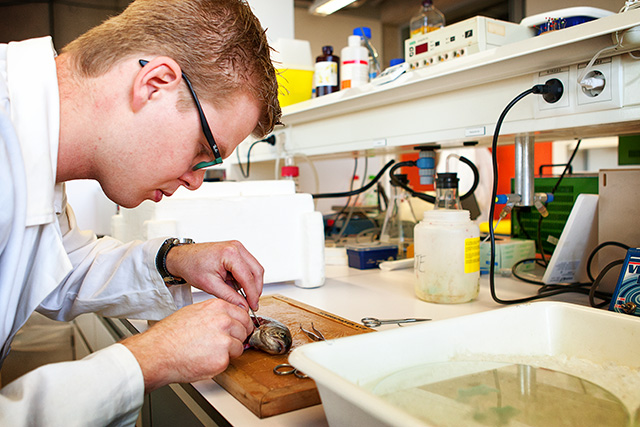
Also, fish do react to pain stimuli. If a fish is bitten by a predatory fish or grazes against an object in the water, it feels it. ‘Just like humans, pigs and chickens, in fact like all vertebrates, fish have nervous tissue that transmits pain stimuli to the brain.’
Flik’s research concludes this too. When you put a zebra fish in a tank divided into a black and a white compartment, it automatically swims to the dark side because it feels safer there. The zebra fish is more vulnerable in the light, where it can be picked out by a heron. In an experiment, Flik administered small electric shocks every time the fish swam to the dark side of the tank. After a while, the fish chose the safe option, and remained on the light side of the tank. ‘This means A: that fish are good at learning and remembering things, and B: that you can influence complex behaviour with adverse stimuli. This means fish can process these stimuli in their brain.’
And here’s the strange thing: this doesn’t stop Flik from eating fish. Because he is, for better or for worse, an ‘omnivore’, as he calls it. ‘Omnivores like humans do better on a varied diet.’ And he likes the taste of fish (and meat). But only if the animals are not subjected to unnecessary suffering. ‘I prefer to eat fish with a sustainability label.’



